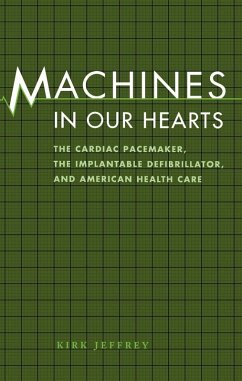Today hundreds of thousands of Americans carry pacemakers and implantable cardioverter-defibrillators (ICDs) within their bodies. These battery-powered machines-small computers, in fact-deliver electricity to the heart to correct dangerous disorders of the heartbeat. But few doctors, patients, or scholars know the history of these devices or how "e;heart-rhythm management"e; evolved into a multi-billion-dollar manufacturing and service industry. Machines in Our Hearts tells the story of these two implantable medical devices. Kirk Jeffrey, a historian of science and technology, traces the development of knowledge about the human heartbeat and follows surgeons, cardiologists, and engineers as they invent and test a variety of electronic devices. Numerous small manufacturing firms jumped into pacemaker production but eventually fell by the wayside, leaving only three American companies in the business today. Jeffrey profiles pioneering heart surgeons, inventors from the realms of engineering and medical research, and business leaders who built heart-rhythm management into an industry with thousands of employees and annual revenues in the hundreds of millions. As Jeffrey shows, the pacemaker (first implanted in 1958) and the ICD (1980) embody a paradox of high-tech health care: these technologies are effective and reliable but add billions to the nation's medical bill because of the huge growth in the number of patients who depend on implanted devices to manage their heartbeats.
Dieser Download kann aus rechtlichen Gründen nur mit Rechnungsadresse in A, B, BG, CY, CZ, D, DK, EW, E, FIN, F, GR, HR, H, IRL, I, LT, L, LR, M, NL, PL, P, R, S, SLO, SK ausgeliefert werden.









